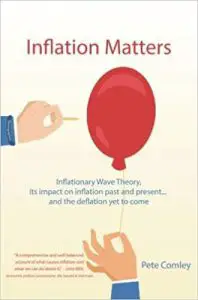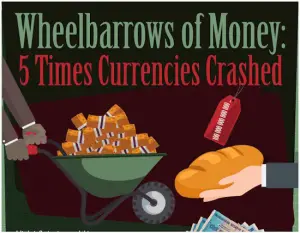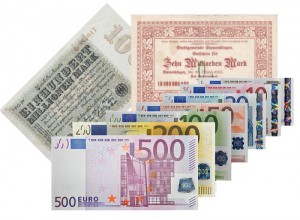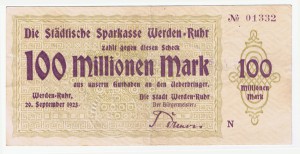In 1903, a lawyer in Germany took out an insurance policy and made payments on it faithfully. When the policy came due in twenty years, he cashed it in and bought a single loaf of bread with the proceeds. He was fortunate. If he had waited a few days longer, the money he received would have bought no more than a few crumbs. Germany had been on the usual fractional reserve gold standard prior to World War I, with the Reichsbank—its central bank—expanding the money supply at a “mild” 1–2 percent inflation rate. When war broke out in 1914, the government followed the standard policy of deficit spending rather than attempting to raise taxes. The Reichsbank’s role was to monetize the … [Read more...]
How Germany is Fudging Their Inflation Numbers
Playing with Official Inflation Statistics: An Example from Germany By Karl-Friedrich Israel The Harmonized Index of Consumer Prices (HICP) consists of 12 subindices, which are weighted according to their shares in total household expenditures. If, for example, food and non-alcoholic beverages (subindex 1) account for 15% of expenditures, they should also be given a weight of 15% in the overall index. In this way, each expenditure category would be given the importance it has for an average household. This is the claim of official statistics. But here, too, as so often, aspiration and reality diverge. In Germany, the traditionally largest subindex covers housing, water, electricity, … [Read more...]
9 Inflation Books You Must Read
For the average person, deflation, inflation, and even hyperinflation may seem quite murky or mysterious. However, it's actually a lot easier than you'd think. With the right books, the idea of inflation can be broken down for you, and you can start to understand how monetary inflation works. You might also like: How the FED Controls the Money Supply Money Multiplier Velocity of Money Agflation- What is it? Inflation and Velocity of Money What is the Real Definition of Inflation? Here are 9 books that you have to check out if you want to understand more about inflation. 1) Inflation Matters by Pete Comley Inflation Matters is a truly comprehensive book … [Read more...]
Hyperinflation: 5 Currencies that Self-Destructed
Over the years we have discussed Hyperinflation a number of times. We've explained that, "Hyperinflation is an extremely rapid period of inflation, usually caused by a rapid increase in the money supply. Usually due to unrestrained printing of fiat currency." Hyperinflation has been recorded as far back as Egypt 276 AD and is usually caused due to some sort of government mismanagement issue. Typically hyperinflation gets progressively worse until the curve goes hyperbolic and then something happens to end the progression. See What is Hyperinflation? for more information. Recently Commodity.com produced an Infographic of 5 currencies that were hit by hyperinflation so with their … [Read more...]
Will Greece Follow Iceland or Weimar Germany?
In Iceland the bankers were told to stuff it. In Weimar Germany they resorted to the printing press. Which model will modern day Greece follow?It seems that the words Weimar Germany and Hyperinflation are almost synonymous. The Weimar Republic (Das Weimarer Republik in German) is the name of the democratic government which was established in 1919 when Germany was defeated in WWI and Emperor Wilhelm II abdicated the throne. The problem came from the War repairations that were foisted upon Germany by the winners and the growing internal unrest which was allowing the Nazi's to gain a foothold. In an effort to pay their debts, promote full employment, and fight back against growing competitive … [Read more...]
Hyperinflation in Weimar Germany vs. The U.S. Now
Postcards From Weimar Germany Justice Litle, Editorial Director, Taipan Publishing Group Monday, September 20, 2010 The Weimar Republic is perhaps the quintessential example of hyperinflation. But the buildup took longer than one might think. Walter Levy is a German-born oil consultant. His father, a German lawyer, took out a life insurance policy in 1903. Every month he had made the payments faithfully," recounts Levy. "It was a twenty-year policy, and when it came due, he cashed it in and bought a single loaf of bread. Such was life in the German Weimar Republic. Things got so bad there for a while, dentists and doctors stopped asking for currency, seeking … [Read more...]







